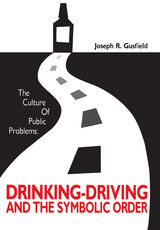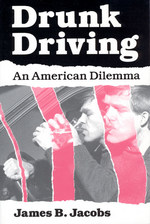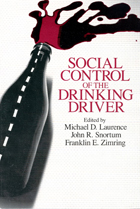4 books about Drunk driving

The Culture of Public Problems
Drinking-Driving and the Symbolic Order
Joseph R. Gusfield
University of Chicago Press, 1980
"Everyone knows 'drunk driving' is a 'serious' offense. And yet, everyone knows lots of 'drunk drivers' who don't get involved in accidents, don't get caught by the police, and manage to compensate adequately for their 'drunken disability.' Everyone also knows of 'drunk drivers' who have been arrested and gotten off easy. Gusfield's book dissects the conventional wisdom about 'drinking-driving' and examines the paradox of a 'serious' offense that is usually treated lightly by the judiciary and rarely carries social stigma."—Mac Marshall, Social Science and Medicine
"A sophisticated and thoughtful critic. . . . Gusfield argues that the 'myth of the killer drunk' is a creation of the 'public culture of law.' . . . Through its dramatic development and condemnation of the anti-social character of the drinking-driver, the public law strengthens the illusion of moral consensus in American society and celebrates the virtues of a sober and orderly world."—James D. Orcutt, Sociology and Social Research
"Joseph Gusfield denies neither the role of alcohol in highway accidents nor the need to do something about it. His point is that the research we conduct on drinking-driving and the laws we make to inhibit it tells us more about our moral order than about the effects of drinking-driving itself. Many will object to this conclusion, but none can ignore it. Indeed, the book will put many scientific and legal experts on the defensive as they face Gusfield's massive erudition, pointed analysis and criticism, and powerful argumentation. In The Culture of Public Problems, Gusfield presents the experts, and us, with a masterpiece of sociological reasoning."—Barry Schwartz, American Journal of Sociology
This book is truly an outstanding achievement. . . . It is sociology of science, sociology of law, sociology of deviance, and sociology of knowledge. Sociologists generally should find the book of great theoretical interest, and it should stimulate personal reflection on their assumptions about science and the kind of consciousness it creates. They will also find that the book is a delight to read."—William B. Bankston, Social Forces
"A sophisticated and thoughtful critic. . . . Gusfield argues that the 'myth of the killer drunk' is a creation of the 'public culture of law.' . . . Through its dramatic development and condemnation of the anti-social character of the drinking-driver, the public law strengthens the illusion of moral consensus in American society and celebrates the virtues of a sober and orderly world."—James D. Orcutt, Sociology and Social Research
"Joseph Gusfield denies neither the role of alcohol in highway accidents nor the need to do something about it. His point is that the research we conduct on drinking-driving and the laws we make to inhibit it tells us more about our moral order than about the effects of drinking-driving itself. Many will object to this conclusion, but none can ignore it. Indeed, the book will put many scientific and legal experts on the defensive as they face Gusfield's massive erudition, pointed analysis and criticism, and powerful argumentation. In The Culture of Public Problems, Gusfield presents the experts, and us, with a masterpiece of sociological reasoning."—Barry Schwartz, American Journal of Sociology
This book is truly an outstanding achievement. . . . It is sociology of science, sociology of law, sociology of deviance, and sociology of knowledge. Sociologists generally should find the book of great theoretical interest, and it should stimulate personal reflection on their assumptions about science and the kind of consciousness it creates. They will also find that the book is a delight to read."—William B. Bankston, Social Forces
[more]

Drinkers, Drivers, and Bartenders
Balancing Private Choices and Public Accountability
Frank A. Sloan, Emily M. Stout, Kathryn Whetten-Goldstein, and Lan Liang
University of Chicago Press, 2000
According to the United States Public Health Service, over 100,000 deaths a year are attributable to alcohol, including 20,000 highway fatalities. In response, legislatures have enacted various forms of regulation intended both to reduce alcohol consumption and to curb its harmful effects. This groundbreaking study focuses on one such form of regulation, the liability imposed on alcohol servers and social hosts by tort law. Basing their analysis on important new data from their extensive research and in-depth interviews with actors on all sides of the issue, the authors conclude that, despite their relative unpopularity, tort laws are very effective in reducing accidents—even more than criminal sanctions.
Extraordinary in scope and exacting in detail, Drinkers, Drivers, and Bartenders: Balancing Private Choices and Public Accountability links alcohol problems, deterrence, and serving practices in a way no other work has been able to do and is certain to become a crucial reference point for researchers and policymakers alike.
Extraordinary in scope and exacting in detail, Drinkers, Drivers, and Bartenders: Balancing Private Choices and Public Accountability links alcohol problems, deterrence, and serving practices in a way no other work has been able to do and is certain to become a crucial reference point for researchers and policymakers alike.
[more]

Drunk Driving
An American Dilemma
James B. Jacobs
University of Chicago Press, 1989
In this ambitious interdisciplinary study, James B. Jacobs provides the first comprehensive review and analysis of America's drunk driving problem and of America's anti-drunk driving policies and jurisprudence. In a clear and accessible style, he considers what has been learned, what is being done, and what constitutional limits exist to the control and enforcement of drunk driving.
[more]

Social Control of the Drinking Driver
Edited by Michael D. Laurence, John R. Snortum, and Franklin E. Zimring
University of Chicago Press, 1988
Drunken driving is the most serious crime likely to be committed by an adult. Each year in the United States it is responsible for approximately 20,000 fatalities, more than 500,000 arrests, and millions of violations. It involves a wider variety of social classes and economic strata than any other major violation of the law. Only recently, however, has the problem of alcohol and traffic safety received attention as a public policy issue.
Social Control of the Drinking Driver lays the groundwork for a much needed integration of methods, principles, and priorities. Law, criminology, biology, psychology, sociology, economics, public policy—the disciplines concerned with the problem of drinking and driving are many and varied, and research crosses national boundaries as well. It is not surprising, therefore, that an integrated general perspective has not yet emerged. Drawing on fourteen specialists and surveying the situations in nine countries, this book presents a comprehensive statement of current knowledge about drunken driving and its control.
Social Control of the Drinking Driver lays the groundwork for a much needed integration of methods, principles, and priorities. Law, criminology, biology, psychology, sociology, economics, public policy—the disciplines concerned with the problem of drinking and driving are many and varied, and research crosses national boundaries as well. It is not surprising, therefore, that an integrated general perspective has not yet emerged. Drawing on fourteen specialists and surveying the situations in nine countries, this book presents a comprehensive statement of current knowledge about drunken driving and its control.
[more]
READERS
Browse our collection.
PUBLISHERS
See BiblioVault's publisher services.
STUDENT SERVICES
Files for college accessibility offices.
UChicago Accessibility Resources
home | accessibility | search | about | contact us
BiblioVault ® 2001 - 2024
The University of Chicago Press









